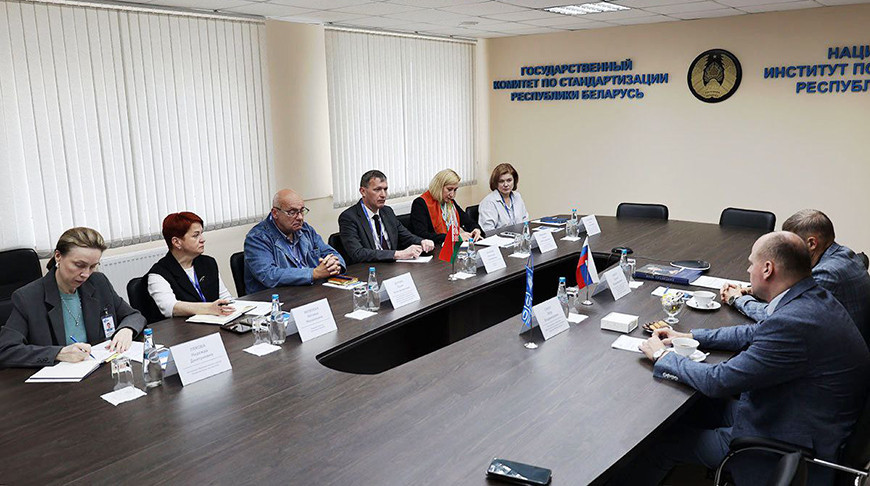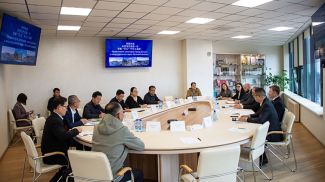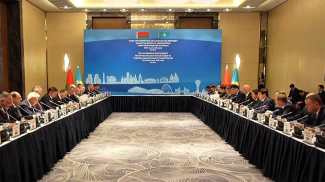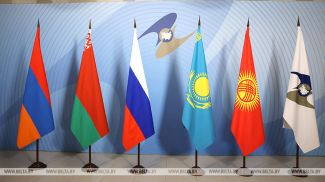
MINSK, 13 June (BelTA) – The Belarusian State Institute for Standardization and Certification (BelGISS) hosted consultations between specialists from Belarus and Russia on the development of artificial intelligence (AI) standards, BelTA learned from the press service of Belarus’ State Standardization Committee.
Head of Technical Rate Setting and Standardization Department at the State Standardization Committee Oksana Grishkevich emphasized that Belarus prioritizes AI development not only in the technical sphere but in almost all areas of life. The country plans to expand work in this direction in the near future. "Just a few days ago, we received detailed proposals from the United Institute of Mechanical Engineering [of the National Academy of Sciences of Belarus] regarding the work of the interstate standardization committee on artificial intelligence," she noted.
Director of BelGISS Aleksandr Skuratov expressed gratitude to the meeting participants for their willingness to cooperate and provide support: "For our institute, this is an extremely interesting area. We have already developed several standards, including industry-specific ones related to vehicles and control systems, as Belarus is currently establishing a testing ground for autonomous vehicles."
"The United Nations Development Programme (UNDP) has its own strategic plan for digitalization and plan to support national efforts in developing regulatory framework and applying artificial intelligence. We appreciate your efforts and your interest in our reports. Thanks to this cooperation, we can work in accordance with the goals set by Belarus," said Piotr Sachek, Research Director at UNDP Belarus Accelerator Lab.
Sergei Garbuk, Acting Director of the All-Russian Institute for Scientific and Technical Information of the Russian Academy of Sciences and Chairman of the Technical Committee on AI Standardization of Russia, stressed that the committee initially focused on industry-specific risks but has placed a primary emphasis on machine learning methods. Currently, machine learning is one of the most relevant areas of AI development.
The meeting between the specialists emphasized that AI technologies offer significant advantages across various sectors, including the economy, manufacturing industry, social area, and security. However, they require specific approaches due to risks primarily related to the accuracy of machine learning algorithms. The Belarusian expert provided an overview of key aspects in AI relevant to the development of the country's regulatory and technical framework. Particularly useful was the discussion of cases where AI regulation is either excessively strict or, conversely, too lenient.
The meeting also addressed the issues of prioritizing ethics and safety in the requirements for the use of AI technologies and training related to AI application.
The maters of AI standards development are expected to be addressed during the roundtable discussion "AI Standardization", which will take place within the Digital Expo TIBO 2025 on 20 June.
Head of Technical Rate Setting and Standardization Department at the State Standardization Committee Oksana Grishkevich emphasized that Belarus prioritizes AI development not only in the technical sphere but in almost all areas of life. The country plans to expand work in this direction in the near future. "Just a few days ago, we received detailed proposals from the United Institute of Mechanical Engineering [of the National Academy of Sciences of Belarus] regarding the work of the interstate standardization committee on artificial intelligence," she noted.
Director of BelGISS Aleksandr Skuratov expressed gratitude to the meeting participants for their willingness to cooperate and provide support: "For our institute, this is an extremely interesting area. We have already developed several standards, including industry-specific ones related to vehicles and control systems, as Belarus is currently establishing a testing ground for autonomous vehicles."
"The United Nations Development Programme (UNDP) has its own strategic plan for digitalization and plan to support national efforts in developing regulatory framework and applying artificial intelligence. We appreciate your efforts and your interest in our reports. Thanks to this cooperation, we can work in accordance with the goals set by Belarus," said Piotr Sachek, Research Director at UNDP Belarus Accelerator Lab.
Sergei Garbuk, Acting Director of the All-Russian Institute for Scientific and Technical Information of the Russian Academy of Sciences and Chairman of the Technical Committee on AI Standardization of Russia, stressed that the committee initially focused on industry-specific risks but has placed a primary emphasis on machine learning methods. Currently, machine learning is one of the most relevant areas of AI development.
The meeting between the specialists emphasized that AI technologies offer significant advantages across various sectors, including the economy, manufacturing industry, social area, and security. However, they require specific approaches due to risks primarily related to the accuracy of machine learning algorithms. The Belarusian expert provided an overview of key aspects in AI relevant to the development of the country's regulatory and technical framework. Particularly useful was the discussion of cases where AI regulation is either excessively strict or, conversely, too lenient.
The meeting also addressed the issues of prioritizing ethics and safety in the requirements for the use of AI technologies and training related to AI application.
The maters of AI standards development are expected to be addressed during the roundtable discussion "AI Standardization", which will take place within the Digital Expo TIBO 2025 on 20 June.













